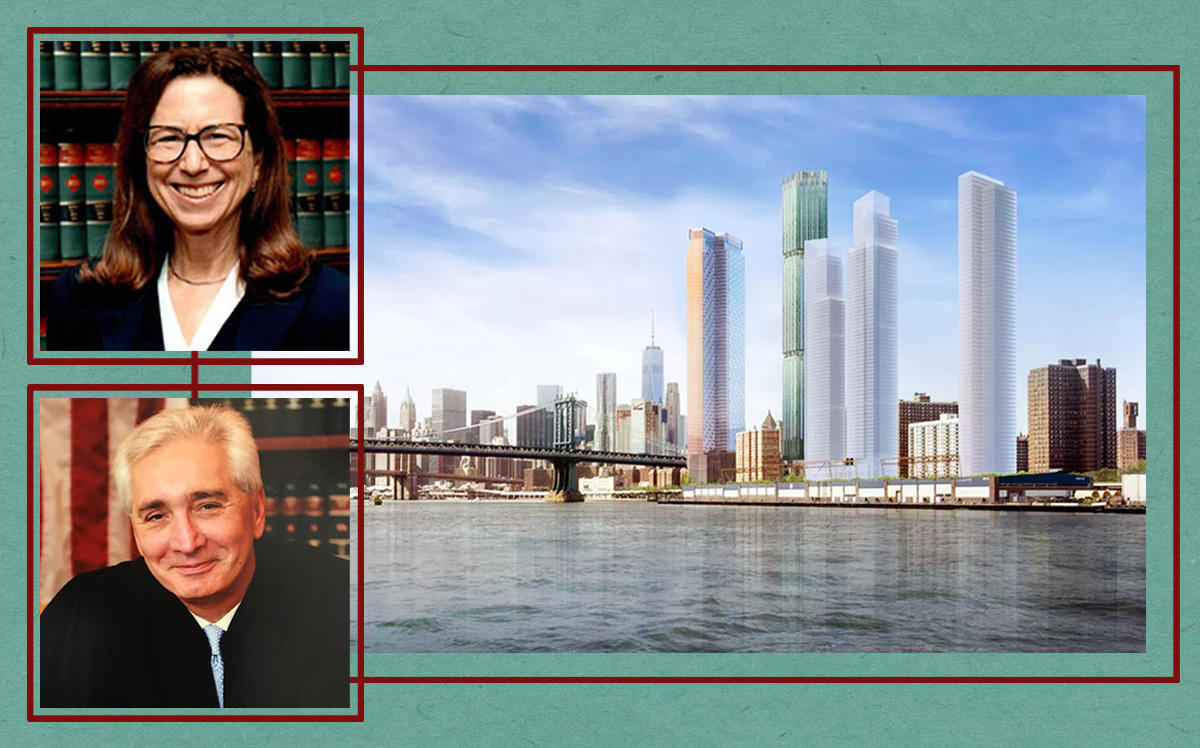Trending
 Evictions surge at Hialeah’s luxury apartment projects Shoma Village, Pura Vida and Manor
Evictions surge at Hialeah’s luxury apartment projects Shoma Village, Pura Vida and Manor Lawmakers reach sweeping housing deal with “good cause eviction,” new 421a
Lawmakers reach sweeping housing deal with “good cause eviction,” new 421a Charles Schwab slashing Chicago office space with big subleases
Charles Schwab slashing Chicago office space with big subleases Tony Park and Elad Dror take a gamble on Koreatown office-to-resi conversion
Tony Park and Elad Dror take a gamble on Koreatown office-to-resi conversionJudges question need for public review of controversial Two Bridges projects
Developers appealed a decision that halted four towers

Two appellate court judges expressed doubt Thursday that four planned Manhattan towers require City Council approval.
A panel of appellate justices held a hearing on whether three projects — JDS Development’s 247 Cherry Street; L+M Development and CIM Group’s 260 South Street; and Starrett Corporation’s 259 Clinton Street — must go through the city’s seven-month public review process known as Ulurp.
Two of the justices grilled an attorney representing the City Council and Manhattan Borough President Gale Brewer, who have argued that the projects in the Two Bridges neighborhood must undergo public review — which would give the local council member power to shrink or kill them.
Justices Anil Singh and Ellen Gesmer agreed that an attorney representing the City Council and Brewer was trying to “bootstrap” the reasoning for a 1995 special permit in the neighborhood onto the approval process for the Two Bridges towers. Special permits are one of the dozen actions that require Ulurp, a multiple-step review process that culminates in a make-or-break vote by the City Council.
Gesmer said the 1995 special permit “isn’t that central to this case” and said attorney Debbie Greenberger, who represented the Council and Brewer, made a “circular” argument in favor of Ulurp.
Singh said the special permit applied to a specific project in the neighborhood that required a waiver from the area’s zoning rules — which is not the case for the four towers. He questioned why the City Council was taking action against the projects through litigation.
“Shouldn’t the City Council have amended the zoning resolutions years and years ago?” Singh said, referring to an argument made by the developers’ attorney. “You are going through all sorts of hoops to say that a review is necessary.”
The City Council and borough president argue that the City Planning Commission wrongfully approved the towers as a “minor modification” of a large-scale development plan approved for the neighborhood in 1972.
Last August, a state Supreme Court judge ruled in favor of the Council and Brewer, finding that the projects must undergo public review. In his decision, Judge Arthur Engoron wrote that failing to allow the City Council to review a land-use decision that would drastically alter a neighborhood would “distort the city’s carefully crafted system of checks and balances.”
The developers, whose projects would rise 60 to 100 stories and add 2,775 rental units across four towers at three addresses, appealed.
Greenberger said the City Planning Commission’s decision against requiring Ulurp represented an “incredible overreaching” of its authority. When asked by Gesmer if members of the community still had an opportunity to publicly discuss the projects, Greenberger acknowledged that they did.
“There were many points where the public could speak, but never any points where they were listened to,” she said.
A representative for the developers pointed to promised upgrades to the East Broadway subway station and to three public parks in the neighborhood as a product, in part, of public input.
Skepticism from the two justices provided a glimmer of hope to the developers, who have faced a series of setbacks in the past year. They have been hit with three separate lawsuits seeking to halt the projects, and Judge Engoron has ruled against them in two.
A separate ruling against SJP Properties and Mitsui Fudosan America, which imperils the future of their condo tower 200 Amsterdam Avenue, has further fueled concern in the real estate industry over the reliability of as-of-right development. In both the West Side and Two Bridges cases, the de Blasio administration and the developers are on the same side.
“These projects, there’s no dispute, comply with underlying zoning in every way,” Janice Mac Avoy, who is representing the Two Bridges developers, said Thursday. “A fact that the owners relied on when investing in these sites.”
Gesmer asked Mac Avoy, “How do you explain to community residents that such an obviously large change doesn’t mean they have a right to have any input into what is happening?”
“New York is based on as-of-right zoning,” she said. “What zoning allows in this district is unlimited height restrictions.”
Write to Kathryn Brenzel at kathryn@therealdeal.com
